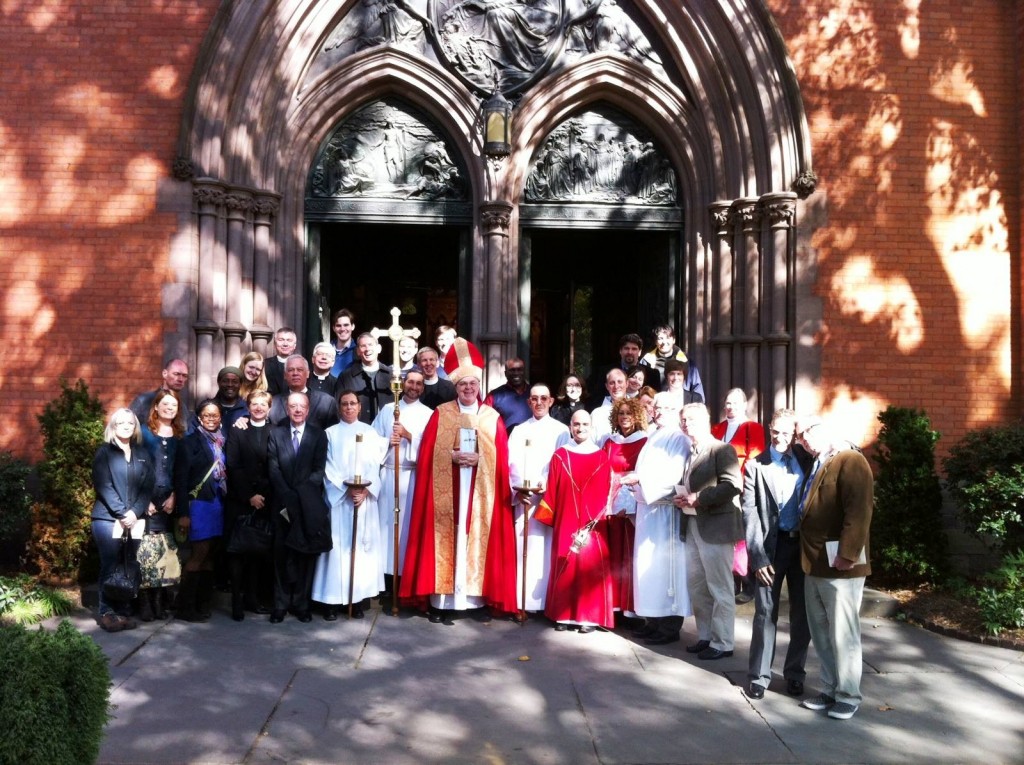 With the leaves falling off the trees in droves, I am currently in allergy mode. This means my mood is less than pleasant. As an identical twin, I knew this day would come. I knew that my sinuses would eventually revolt against my well being. I’ve watched my brother suffer with these issues since we were little, but only in the last year did my allergies actively start kicking my butt. So, at this moment, many things bug me at the moment. In fact, maybe all the things bug me right now. And as I sit here, at this exact moment, what I’m mot tired of is reminding everyone at my seminary that I’m Lutheran. From being asked to take the Episcopal church’s ordination exam, to being assumed I’m ordained just because I served with my bishop, to having to spend my history class learning about the English reformation, I’m just tired of it. I’m here, I’m Lutheran, deal with it.
With the leaves falling off the trees in droves, I am currently in allergy mode. This means my mood is less than pleasant. As an identical twin, I knew this day would come. I knew that my sinuses would eventually revolt against my well being. I’ve watched my brother suffer with these issues since we were little, but only in the last year did my allergies actively start kicking my butt. So, at this moment, many things bug me at the moment. In fact, maybe all the things bug me right now. And as I sit here, at this exact moment, what I’m mot tired of is reminding everyone at my seminary that I’m Lutheran. From being asked to take the Episcopal church’s ordination exam, to being assumed I’m ordained just because I served with my bishop, to having to spend my history class learning about the English reformation, I’m just tired of it. I’m here, I’m Lutheran, deal with it.
Category: Seminary
Charles ‘Nanowrimo’ Simeon – My Senior Sermon
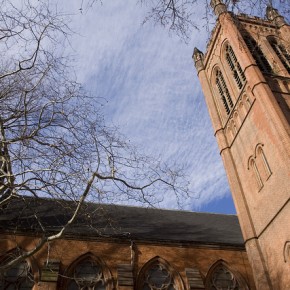 Delivered at the General Theological Seminary on November 12, 2013, 6 pm Eucharist. Lesser feast day of Charles Simeon.
Delivered at the General Theological Seminary on November 12, 2013, 6 pm Eucharist. Lesser feast day of Charles Simeon.
Readings: Romans 10:8b-17, John 21:15-17
No audio.
*****
November ‚Äì November is an event – at least here in New York. Fall just sort of happens; the trees turn gold, red, or a really tired brown. The first snow fall appears, we no longer know how to dress for the cold subway platforms and hot subway cars, and Christmas music becomes the soundtrack of our entire life. And if you’re a child of the internet like me, November brings even more events. There’s Movember where growing a mustache helps you raise money for charity; Facebook feeds are filled with people celebrating 30 days of thankfulness and then there’s Nanowrimo, where writers across the world commit themselves to writing a novel in just 30 days. 30 days to take the story inside of us and put it on paper. One whole month to create something brand new. 30 days, 50,000 words, the next great American novel ‚Äì and maybe, just maybe, completing one of our life’s great works.
Now, today is the feast day of Charles Simeon. His is a name that I haven’t come across before because, as a Lutheran, his day doesn’t show up in the front of my hymnal. So, when the rota first came out, I turned to the great knowledge bank that is Wikipedia to discover who he is. And as I scanned through the article, I really wondered why the Spirit was calling me to preach my senior sermon on a Vicar from Cambridge. Born in 1759, Charles grew up in the middle class. He attended Cambridge, became ordained, and served Holy Trinity Church in Cambridge for 54 years until his death. He helped pick missionaries for India, started the Church Missionary Society, help develop the idea of campus ministry, and might have even invented small group ministry while at Holy Trinity. And as I kept scanning, I noticed a word that kept popping up in his biography, over and over,: the word ‘evangelical’. So maybe that’s why I’m up here ‚Äì to talk about that word in this place ‚Äì since that word is in my denomination’s name. I’m a member of the Evangelical Lutheran Church in America. We just celebrated our 25th birthday, and we’re a product of the last 300 years of splits and mergers of various Lutheran church bodies throughout the United States. And we purposefully grabbed onto that word “Evangelical” knowing full well that, in this modern US context, we no longer own it. But just because we don’t own it, that doesn’t mean Jesus doesn’t call us to live that word out ‚Äì to be evangelical – in everything that we do.
“The word is near you, on your lips and in your heart” – that’s how our reading from Romans starts, with words from Moses. This quote comes from Deuteronomy, in the middle of Moses’ last great sermon to the people before his death. After 40 years in the desert, on the shores of the Jordan, Moses gathered the tribes of the Exodus together to bring their experiences into a word and to draw them into the covenant that God had made with them. Moses stood before the people, and stands before us, to say that this covenant from God ‚Äì it’s no far away – it’s right here, right now, on our lips and in our hearts. That gift ‚Äì resides not buried in some place deep no, it is at the center of who we are and in what we communicate. That Word that Jesus is Lord, that forgiveness, mercy, and love happens to us, that Jesus actually matters, that’s what is on our lips, in our words, in the air that we breath in and in the air that we breath out ‚Äì in and out. And isn’t that unbelievably scary?
Because if you take up the sum of all of our parts ‚Äì everything that is a part of who we are, from the tips of our toes to the top of our heads ‚Äì I bet we could think of at least one thing that we said that probably wasn’t very Christ like. There was probably a thought or two that might, just might, have been negative of another person, judgmental, or maybe we didn’t think of the other person at all. We carry with us a history of hurt that has been done to us and that we have done to others. The breaking of relationships, the hurtful things said in anger, the joys we feel that blind us to the plight of our neighbor ‚Äì taking us as a total package just shows that we’re not perfect. Taken seriously as a whole, can I ever truly believe? Is there anything that I can do to make me right with God? In the great Nanowrimo of our lives, in the novels we write everyday in our actions, thoughts, words, and deeds ‚Äì can my heart truly believe? How faithful can I actually be?
But it’s not my faith that I’m counting on; it’s God’s faithfulness to me.
Faith is a gift. Trust is a gift. Trusting in the promises of God ‚Äì promises made at the foot of the Cross – promises made to us in our baptisms ‚Äì promises that we did not earn but that were given to us because that’s just what God does ‚Äì God has made that my story; God has made that our story. And that’s the Christ event ‚Äì the external work of God telling the entire world that God loves you, all of you, and that all of you matters. Not just the part that is good; not just the part that might have a good hair day every once in awhile; or the part that is all smiles and has no sorrows ‚Äì no, all of us matters. We, as total packages, matter to God. Christ died and lives for us. And we die and live in Christ. Our relationship to God doesn’t depend on us ‚Äì our relationship to God depends on God’s faithfulness, God’s promises, God’s gifts ‚Äì gifts that are given every day, to feed and nourish us, to help us be little Christ’s to our friends and neighbors. And to give fully, to love completely, to listen and see all who are unseen. We are called to boldly go and live out the Christ event everyday, not because we are perfect; not because, as seminarians or professors, priests or pastors, Episcopalians or Lutherans, that we just know more ‚Äì we live out the Christ event because the Christ event has been given to each of us first. Because God has claimed us; and in that claiming walks with us, fully, and completely. That’s our story; that’s the story that God writes in our hearts and on our lips; that’s the story that we are called to proclaim, to confess – we’re called to fill the air around us with God’s love, God’s faithfulness, Christ’s story, and our story too.
And Charles Simeon ‚Äì I think he got that ‚Äì because that’s the heart of being an Evangelical ‚Äì proclaiming and confessing the story of Jesus Christ. Being evangelical isn’t a worship style, political party, or a social contract. No, it is proclaiming God’s love for me, for you, and for the whole world. The telling of God’s story, that was Charles Simeon’s claim to fame. During his years of preaching, he wrote and published what he called “Sermon Skeletons” – outlines of sermons that were spread all throughout England. And these sermon outlines became his commentary on the bible. That’s how he saw the text ‚Äì a story not only to be read but to be proclaimed. By the time he died, his sermon skeletons covered most of the bible and filled 21 volumes. It’s still in print today. Pastors and priests continue to reflect on his words ‚Äì and on his proclaiming and confessing of Christ’s story because that was his story; because God made that his story; and because God continues to make that our story too. God has claimed us all as evangelicals ‚Äì we are called to be the feet that brings good news into new places so that in all that we do, in all that we say, in the novels that we write and live out everyday, we know that the Word is near ‚Äì the Word is on our lips ‚Äì the Word is in our hearts ‚Äì and Christ is with us. Amen.
One Postive Candidacy Quirk
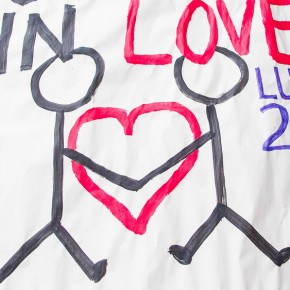 I’ve been dying to write about last week’s Candidacy retreat but, alas, I have not found a moment to put my thoughts down on electric pixels. However, I would like to announce to everyone that just because you turn in your Approval essay to your candidacy committee and affiliated seminary, that does not mean that such a document is firmly locked in stone. If, like me, you discover typos and bad grammar while en-route to your faculty interview, you can send a quick email to the head of your candidacy committee and ask if you can make some changes and replace it. There’s a chance that they’ll say yes.
I’ve been dying to write about last week’s Candidacy retreat but, alas, I have not found a moment to put my thoughts down on electric pixels. However, I would like to announce to everyone that just because you turn in your Approval essay to your candidacy committee and affiliated seminary, that does not mean that such a document is firmly locked in stone. If, like me, you discover typos and bad grammar while en-route to your faculty interview, you can send a quick email to the head of your candidacy committee and ask if you can make some changes and replace it. There’s a chance that they’ll say yes.
So, my updated essay is now emailed to the Synod’s office. This will be printed out and handed to the candidacy committee for review prior to December 14. I’m currently waiting to see the report my faculty committee drew up and what will actually be presented to the faculty at LTSP on Tuesday, November 12. So many things to wait for and do. God willing, I’ll start working on the mobility papers this weekend. But, let’s be honest – when it comes to my to-do list, hope springs eternal.
Out High-Massing the Episcopalians
It happened – the Lutherans took over General’s Chapel.
Yesterday, at our Thursday Eucharist, the Lutherans of the Metropolitan New York Synod stormed into the Chapel of the Good Shepherd, and spread law and gospel all over the place. Our six foot tall bishop with his 20 foot tall hat, with a mighty whack of his boot, battered those doors down and we, like our barbarian and viking ancestors of old, poured into that place and, let me tell you, we processed the hell out of that place! Luther himself would have been proud – some of us even sung “A Mighty Fortress” in GERMAN. We Lutheranized the place, taking over the liturgy, the space, and even using the words law and gospel from the pulpit.
It was beautiful.
I am not the biggest fan of high mass worship services (or even calling Lutheran worship services mass) but we tore that place up. The pastors of St. Peter’s organized everything, bringing their own vestments, choir, organist, and deacons to the service. The service was intentionally designed to be welcoming to our episcopalian friends by including a thurifer, incense, smells (but no bells) and even praying for the Archbishop in the prayers of the people (along with all our other ecumenical partners). The service even had me as a sub-deacon. Sub-deacon! I still don’t even know what that was (but my episcopalian friends were really confused and thought I was ordained already). But I did get to serve alongside the bishop. That was fun.
We had around 65 students, professors, alumni, and guests present. Bishop Rimbo preached a fine service and the gluten free bread provided by St. Peter’s was actually delicious. We filled the chapel with sound and singing, outdoing any Episcopalian service that I’ve been to yet. And we made sure that the entire service was in the bulletin. Not having to use three different books during the service blew everyone’s minds. The comments from the student body to me have been nothing but positive. They loved it. They want to see more of it. And, I’m with them on this because I found this whole thing awesome.
But (and there’s always a but) I’m still struggling with the very idea of this kind of worship service itself. There are, at most, three Lutherans on campus. We’re minority and we get that. We also understand the Chapel of the Good Shepherd to be this community’s sacred space. But the very source of how this happened – where the Lutheran liturgy was transplanted into the community from outside of it, that bothers me. The service only worked because we brought in our own choir, organist, and vestments. I felt like being a member of a band on tour. We came in, setup our stuff, had an amazing show, and then packed up and left. Even though law and gospel was preached, the sacraments celebrated, and worship was done beautifully and well, we were still a show. This wasn’t a service rooted from within the community, it was a showcase. And that gets me because the Lutheran liturgy isn’t a showcase. It’s worship but worship for a gathered community. It comes out of the community that the Holy Spirit has called to be at this specific place and at this specific time. The community carries with it tradition, history, understanding, hopes, loss, fears, doubts, joy, anger, and everything else. All of that feeds into the liturgy that speaks to the community. The Lutheran liturgy, when done well, is fed by the gathered community and by God. It isn’t a show – it is the place where God promises to be and where we can, as the gathered community, reliably meet God in a very earthly way. The community at General isn’t Lutheran and that’s okay. And it’s fine to do a worship service, every once in awhile, that showcases the vastness of Christian history and experience. But it can never be just for show. If it is, then it really can’t be called worship, can it? But, well, it was a lot of fun filling that Chapel with Lutheran sounds, words, images, and noise. And I did look good standing up there, yessir. And it felt downright subversive to say ” “the blood of Christ for you” during communion in that space. So maybe I was the barbarian in that space. I’m okay with that.
Quirks of Candidacy: Faculty Interview Edition
 The next stage in my ordination process? The dreaded faculty interview.
The next stage in my ordination process? The dreaded faculty interview.
Dun dun ddduuuunnnnnnnnnnn!
Yesterday I woke up early, put on a suit and tie, and headed to Penn Station to jump on the Bolt Bus to Philadelphia. The seats were not as comfy as I remembered, nor were their cup holders, but I was off to the Lutheran Seminary at Philadelphia for my faculty interview.
For those of you who don’t know, the faculty interview is part of the candidacy process. After my internship evaluation forms are submitted (which didn’t happen till October 10th – I know, I know), I’m required to visit the seminary I am affiliated with (LTSP) and be interviewed by various faculty members. These faculty members (two) are, in essence, a sub-committee for the entire faculty body. The candidate (i.e. me) am interviewed and the two faculty members write a report. The report will be presented to the entire faculty in November. The entire faculty body has an opportunity to amend, change, or enquire about that report. After the report is given (and/or modified), the faculty votes and sends a recommendation to my candidacy committee in New York. They can recommend that I should be approved for ordination, delay my ordination, or that I should not be ordained at all. Based on that recommendation, my candidacy committee in New York has the option of going one step “up” or “down” from what the faculty recommend. So, if the faculty said my ordination should be delayed, the candidacy committee is “allowed” to change that up one (I should be ordained) or down one (I should be denied). If the candidacy committee does make this change, the faculty must be re-consultant and a conversation between the faculty and the candidacy committee will ensue. There is, in theory, a chance that the candidacy committee could jump two steps (say, from denial to approval or approval to denial). If that happened, I’m not sure what processes would need to be followed but I’m hoping it would involve a very un-hilarious version of ABC’s “Wipe Out.”
Most of this process, especially the bit about the back and forth between the faculty and the candidacy committee, I did not know. My two faculty interviewers explained it to me before the beginning of our chat. They also told me that anything was fair game; they could ask any question about anything. Six weeks ago, I was asked who I wanted on my panel so I picked the two professors who I knew the best and who knew me the best based on my classwork. Before the interview began, I sat in a comfy chair and was promptly asked to step out of the room so that the two could develop their game plan. After ten minutes, I was ushered back in. I took my seat, the process was explained, and away we went. We chatted for an hour.
I had a lot of fun.
I’ll be able to report the final verdict once the November faculty meeting takes place but I really found the whole thing affirming and invigorating. I got to talk about faith, the church, the role of Word and Sacrament, and myself for an hour. Who doesn’t love talking about themselves? And it was worth the ridiculous commute. I left my apartment at 6:45 am and arrived at the seminary at 11:15 am. I left the seminary at 1:30 pm and arrived back at my apartment at 5:45 pm. I even had enough time to kiss the wife, hug the toddler, and see the back of a bunch of bishops during the installation of my seminary’s new dean before I had to rush uptown to a church council meeting. One more step finished in the process. Next up, fixing my approval essay (there are SO many typos in it), a candidacy retreat next Friday, then submitting a 16 page resume to the churchwide body by December 1.
I’m getting closer, God-willing.
The most expensive meals…..in the (ministry) world
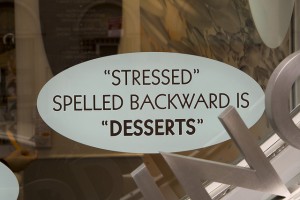 One of the more irksome realities of seminary living is having to purchase the meal plan. Usually, the food is pretty terrible, expensive, or both. My work schedule is so constant that if I have any free time, I am 70 blocks north and not on the seminary campus. And the seminary meal plan only covers one meal – lunch. It kicked off 3 weeks ago during orientation week. I’ve eaten there four times. The food is good, mind you, but I’m not a vegetarian so the fact that there are plenty of meat options make me happy (and I really love the cookies they provide). I also know that my funding of the meal plan is really helping to support the staff (including the wonderful ladies who watch Oliver all week long), faculty, facility workers, administrators, receptionists, and executives enjoy a meal while I’m at work. The meal plan is $1350 a semester. Since I’ve eaten lunch four times, each meal cost me $337.50. That is why I typically overload my plates and have seconds – I want to make it count.
One of the more irksome realities of seminary living is having to purchase the meal plan. Usually, the food is pretty terrible, expensive, or both. My work schedule is so constant that if I have any free time, I am 70 blocks north and not on the seminary campus. And the seminary meal plan only covers one meal – lunch. It kicked off 3 weeks ago during orientation week. I’ve eaten there four times. The food is good, mind you, but I’m not a vegetarian so the fact that there are plenty of meat options make me happy (and I really love the cookies they provide). I also know that my funding of the meal plan is really helping to support the staff (including the wonderful ladies who watch Oliver all week long), faculty, facility workers, administrators, receptionists, and executives enjoy a meal while I’m at work. The meal plan is $1350 a semester. Since I’ve eaten lunch four times, each meal cost me $337.50. That is why I typically overload my plates and have seconds – I want to make it count.
I’m curious what my per meal cost will be once December hits. At this rate, I think I’m pushing 28 meals for the entire semester (making sure to not include Thanksgiving week or my fall break) which would give me a per meal cost of $48.21. There’s no meal a seminary can put together, even in the heart of NYC, that is worth that much.
Thought of the day
While reading the newest update from my seminary about their operating plans, I find myself dwelling on the following thought: when a religious organization follows the business culture around them and begins to lay off staff and combine previous positions, giving current employees more work for no increase pay and creating economic hardships for others, all for the good of the institution, should the religious organization actually use the language of business and claim that this is all for “efficiency” purposes? Even in the current economic environment where cutting positions is normal and even if the institution needs to save money, is it truly a pastoral response to use the fake language of the business world? Or can we just be blunt with our use of language? And if not, why not? There’s a difference between being pastoral and appearing phony and I think the church runs into problems when it thinks that using the language of sugar somehow makes everything better.
Called to debt
 A few days ago The Episcopal Digital Network released three different articles on student debt for seminaries. Since I now attend an Episcopal Seminary, I have, to some degree, two different experiences watching two different churches handle the monster that is seminary debt. At my internship training two weeks ago, supervisors were asking students how much debt they were taking on to be clergy – and it was not unheard of to hear the number “80k” thrown around (including undergraduate loans) [as an aside, these same clergy then would act jealous that they don’t have the “freedom” my generation has…right…] Most students do not receive financing from the wider church nor their home synods and congregations. Instead, they rely on financial grants from the seminary, third-party scholarships, kind spouses, and loans. Luckily, our current loans are backed by the US government (rather than 3rd party folks) but with the loss of subsidized loans, our interest just keeps piling up. With a hope and a prayer, most of us enter into seminary assuming that we’ll have a job coming out but with no guarantee that will actually happen. And with the Lutheran polity being to find a job before ordination, some folks can spend quite awhile waiting for income to “roll” in after graduation.
A few days ago The Episcopal Digital Network released three different articles on student debt for seminaries. Since I now attend an Episcopal Seminary, I have, to some degree, two different experiences watching two different churches handle the monster that is seminary debt. At my internship training two weeks ago, supervisors were asking students how much debt they were taking on to be clergy – and it was not unheard of to hear the number “80k” thrown around (including undergraduate loans) [as an aside, these same clergy then would act jealous that they don’t have the “freedom” my generation has…right…] Most students do not receive financing from the wider church nor their home synods and congregations. Instead, they rely on financial grants from the seminary, third-party scholarships, kind spouses, and loans. Luckily, our current loans are backed by the US government (rather than 3rd party folks) but with the loss of subsidized loans, our interest just keeps piling up. With a hope and a prayer, most of us enter into seminary assuming that we’ll have a job coming out but with no guarantee that will actually happen. And with the Lutheran polity being to find a job before ordination, some folks can spend quite awhile waiting for income to “roll” in after graduation.
When I was at LTSP, I was lucky and found myself to be a Fund for Leaders recipient. I was granted a full-tuition scholarship for my seminary education as long as I attended an ELCA institution. When I left after my first year, I lost that scholarship. I entered General Seminary with a small grant – but that grant does not grow even though my dependents are on the rise. And I’ve discovered, attending a non-Lutheran seminary has cut me off from access to Lutheran scholarships/grants (the few that exist) and, since I’m not an Episcopalian, I do not have access to what my classmates have. Now, this isn’t surprising. As the denominations continue to punt the expenses of leadership formation to individuals themselves (creating a high “buy-in” for folks to enter clergydom), any funds that are available are going to be “for our own.” The ELCA uses “Fund for leaders” to replace any churchwide support to seminaries while the Episcopal seminaries are developing plans to introduce a semi-internship year to their M.Div programs. Part of me is curious, however, if this isn’t just the same kind of behavior that has continued to push the cost of education on the individuals. Because seminaries continue to lose support, they have resorted to trying to make up funding issues by selling properties, aligning themselves with universities, and increasing enrollment. I like the idea of asking bishops to have jobs lined up for candidates for ministry but I wonder how that will work with seminaries trying to increase enrollment. And with the mainline church shrinking, seminaries are in competition with each other for viable candidates. Some seminaries (like LTSP) are trying to get out of that cycle by branching out to other denominations and traditions but GTS is not. Cutting faculty, staff, and increasing enrollment will only get them so far. Even these small funds and scholarships do not, by far, make up for the lost in funding and the increase in cost for seminary education. I think there needs to be a systematic attempt to tackle this issue but I wonder if that is possible. For the Episcopal church, maybe but for Lutherans, maybe not so much. Instead, there needs to be a change in culture that will allow things to die and that, well, that might not be on the cards. But if we’re not willing to let institutions to die, change form, and allow a reformation identity to be part of what it means to be Lutheran (what I mean, is to identify ourselves as those who hold fast to a gospel that is not limited to time or what is going on right now), then I think we’re going to end up with a generation of clergy that are going to bury themselves, their congregations, and the church in either too much debt or we’ll rise up a generation of clergy who are older, second career, rich, male, and white – strangling the opportunities for the church be as big as Scriptures demand it to be.
Moonstruck, Obama, Seminary, and Me
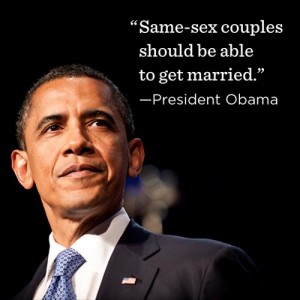 So it seems that during my Church History Final Exam (covering the Oxford movement through the 1960s), President Obama came out and finally announced his support for marriage equality. I’m glad he did. He’s not leading a charge nor is he launching a campaign but he did throw his support to marriage equality (in name at least). And I consider that a big step. It does make the campaign’s behavior after Biden’s “snafu” on Sunday a little hairy – and I, personally, think Biden caused Obama to show his hand earlier than he originally planned. But I’m glad it is out there, done, and I can watch as my facebook newsfeed is covered in “YAY OBAMA” or “BOO OBAMA” comments. It’ll keep the morning lively while I prepare a sermon and study for my NT oral exam.
So it seems that during my Church History Final Exam (covering the Oxford movement through the 1960s), President Obama came out and finally announced his support for marriage equality. I’m glad he did. He’s not leading a charge nor is he launching a campaign but he did throw his support to marriage equality (in name at least). And I consider that a big step. It does make the campaign’s behavior after Biden’s “snafu” on Sunday a little hairy – and I, personally, think Biden caused Obama to show his hand earlier than he originally planned. But I’m glad it is out there, done, and I can watch as my facebook newsfeed is covered in “YAY OBAMA” or “BOO OBAMA” comments. It’ll keep the morning lively while I prepare a sermon and study for my NT oral exam.
After my exam yesterday, the Lutheran professor on campus threw together a lutheran/campus-ministry/taize style liturgy for a small group of Lutherans and supporters on campus. We met in the practice chapel (which is where they keep Jesus until he’s eaten), formed a small circle, and went through a lovely service. I felt bad because I forgot to bring an ELW while one of my episcopal buddies showed up with one (he’s a better Lutheran than me I bet). I’ll admit that it was nice doing a Lutheran Christian liturgy at seminary. I got a little emotional (cuz of some events coming up and, well, I was just plain exhausted after my exam). It was great. I hope they make it into a regular event during the coming year.
Afterwards, two buddies of mine and I went to a local diner to unwind and have dinner. While there (we all had breakfast for dinner mmmmm), a portly, balding, unkept middle aged man came up to us. He had a notepad in hand, looked a tad buzzed, and just started talking. It took about five minutes to realize that this guy claimed to be a reporter and was in Chelsea looking for gays to comment on Obama’s announcement. The reason why it took so long to find this out is because he would not shut up about not being able to find gays in Chelsea. He kept talking to straight guys! Even muscle-bound guys! They were straight too! Can you believe it? His editors was “on his ass” for not getting quotes from the gays. The whole spectacle was incredibly uncomfortable, and really ,really strange. One of my companions was gay, which made the reporter a tad excited, and he brushed me and my other friend off because “I’ve already talked to too many straight guys.” My gay friend, however, didn’t want his name used so the reporter was all “well, I can’t use you!” and shut down the conversation. We suggested that he visit the local club with go-go boys (Rawhide) as we were sure he’d find what he was looking for there. It was honestly one of the weirdest conversations I’ve been privy to in a long time. It didn’t seem real, nor did he seem like a real journalist. Or maybe I just haven’t been interviewed by enough journalists to know how things are done. Either way, if he had stopped talking for a few minutes, and discovered we were all seminarians, he might have taken our quotes more seriously. But, alas, my name in the papers was not to be. Oh well.




